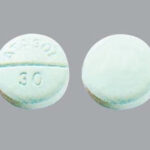Tramacet: Ingredients, Uses, Dosage, Side Effects, Addiction

What is Tramacet used for?
Tramacet is not the same as tramadol but a combination medication containing two active ingredients; tramadol and acetaminophen (paracetamol). Tramadol belongs to a group of medications called opioid analgesics while acetaminophen belongs to a group of medications called analgesics. Tramacet is used to treat moderate to moderately severe pain in adults. Tamacet is a controlled substance. Controlled substances are regulated by the government to prevent abuse and misuse and lower the risk of overdose.
How does Tramacet work?
The two active ingredients in Tramacet (tramadol and acetaminophen) work in synergy to decrease pain. Tramadol is similar to other prescription pain medications, such as codeine, hydrocodone, and morphine. It works by binding to opioid receptors in the brain to block pain signals.
Tramadol has other effects as well. It increases the effects of serotonin and norepinephrine, two important chemical messengers (neurotransmitters) in the brain. Both play a role in pain perception.
Acetaminophen the other ingredient reduces the production of prostaglandins in the brain. Prostaglandins are chemicals that cause inflammation and swelling. Acetaminophen relieves pain by elevating the pain threshold, that is, by requiring a greater amount of pain to develop before a person feels it. It reduces fever through its action on the heat-regulating center of the brain. Specifically, it tells the center to lower the body’s temperature when the temperature is elevated.
The purpose of these combined actions is to help you relieve pain and enable you to function better in your day-to-day life.
How should I take Tramacet?
The usual recommended dose of Tramacet is 1 or 2 tablets every 4 to 6 hours as needed for pain relief, up to a maximum of 8 tablets daily.
Many things can affect the dose of Tramacet that a person needs, such as body weight, other medical conditions, and other medications. If your doctor has recommended a dose different from the ones listed here, do not change the way that you are taking the medication without consulting your doctor.
Tramacet can be taken with or without food. Swallow the tablets whole. Cutting, breaking, chewing, crushing, or dissolving the tablets can result in dangerous side effects, including death. Do not stop taking this medication without talking with your doctor. If this medication is stopped suddenly, you may experience withdrawal symptoms such as anxiety, sweating, trouble sleeping, shakiness, nausea, tremors, diarrhea, or hallucinations. If you plan on stopping the medication, your doctor may want you to reduce the dose gradually to reduce the severity of withdrawal effects.
It is important to take this medication exactly as prescribed by your doctor. If your doctor has told you to take this medication on a regular basis and you miss a dose, take it as soon as possible and continue with your regular schedule. If it is almost time for your next dose, skip the missed dose and continue with your regular dosing schedule. Do not take a double dose to make up for a missed one. If you are not sure what to do after missing a dose, contact your doctor or pharmacist for advice.
Store this medication at room temperature and keep it out of the reach of children.
Do not dispose of medications in wastewater (e.g. down the sink or in the toilet) or in household garbage. Ask your pharmacist how to dispose of medications that are no longer needed or have expired.
What Tramacet overdose symptoms should I know?
The symptoms of Tramacet overdose may include:
- Contracted pupils.
- Extreme drowsiness.
- Slowed breathing.
- Slowed heartbeat.
- Generalized weakness.
- Clamminess.
- Loss of consciousness.
- Abdominal pain.
- Irritability.
- Loss of appetite.
- Jaundice (yellow appearance of skin and eyes)
- Diarrhea.
- Nausea.
- Vomiting.
A marked seizure potential exists for Tramacet when taken in doses that exceed prescribed parameters. In the event of a Tramacet overdose, seek emergency medical attention immediately or call the Poison Help line at 1-800-222-1222. An overdose can be fatal, especially in a child or other person using the medicine without a prescription.
How long does Tramacet stay in your system?
A lot of different factors can affect how long the individual drugs in Tramacet stay in your body. These include:
- How much you took (dosage). The higher the dose, Tramacet the longer will stay in your system.
- How often you take Tramacet. In general, a single dose will stay in your system for the shortest amount of time. If you took more than one dose, or take Tramacet on a regular basis, it stays in your system for a longer period of time.
- Your metabolism. Metabolism refers to the chemical process of breaking down substances that you ingest, such as food or medication. Your metabolic rate can be affected by many things, including your activity level, age, diet, body composition, and genetics. Having a slow metabolism may increase the amount of time it takes to break down Tramacet.
- Your organ function. Reduced kidney or liver function can increase the amount of time it takes for your body to get rid of Tramacet.
- Your age. If you’re over 75, it may take your body longer to get rid of Tramacet.
Each tablet of Tramacet contains tramadol hydrochloride (37.5 mg) and acetaminophen (paracetamol) (325 mg). For most people, this amount of acetaminophen has a half-life in the blood of 1.25 to 3 hours, which means it is eliminated from the body through the urine within 24 hours. Note that this could take longer in people with poor liver function. The tramadol content of Tramacet is detectable in urine for 1-4 days after last use, in hair for 4-6 months, in saliva for up to 48 hours, and in blood for about 12-24 hours.
Who should NOT take this medication?
Do not take this medication if you:
- are allergic to tramadol, acetaminophen, or any ingredients of the medication
- are allergic to other opioid medications (e.g., codeine, morphine)
- are experiencing acute alcoholism or delirium tremens
- are experiencing acute asthma or other obstructive airway disease
- are experiencing acute respiratory depression
- have mild pain, which can be treated with other pain medications
- have or may have an abdominal condition that may require surgery (appendicitis, pancreatitis)
- are intoxicated with alcohol or other medications such as hypnotics, other opioids such as codeine or morphine, or psychotropic medications (i.e., medications for mental health conditions)
- are pregnant, in labour, delivering a baby, or breast-feeding
- are taking or have taken MAO inhibitors (e.g., phenelzine, tranylcypromine, moclobemide) within the last 14 days
- have a blockage of the gastrointestinal tract, particularly paralytic ileus
- have a convulsive (seizure) disorder
- have a head injury, a brain tumour, or increased pressure inside the head or spinal cord
- have severe central nervous system (CNS) depression (e.g., slowed nervous system)
- have severely decreased kidney function
- have severely decreased liver function
- are under 18 years old and have had surgery to treat obstructive sleep apnea
Do not give Tramacet to children less than 12 years old.
What are the side effects of Tramacet?
Many medications can cause side effects. A side effect is an unwanted response to a medication when it is taken in normal doses. Side effects can be mild or severe, temporary or permanent.
The side effects listed below are not experienced by everyone who takes this medication. If you are concerned about side effects, discuss the risks and benefits of this medication with your doctor.
The following side effects have been reported by at least 1% of people taking this Tramacet. Many of these side effects can be managed, and some may go away on their own over time.
Contact your doctor if you experience these side effects and they are severe or bothersome. Your pharmacist may be able to advise you on managing side effects.
- constipation
- decreased appetite
- decreased interest in sexual activity
- decreased sexual ability
- dizziness
- drowsiness
- dry mouth
- fainting
- headache
- itching
- nausea
- sweating
- trouble sleeping
- vision problems
- vomiting
- weakness
Tramacet may cause dependence, addiction, and slowed breathing. Tramacet may be misused and sought after by drug abusers. Tolerance may develop to its effect.
What medications may interact with Tramacet?
Before you start on a prescription of Tramacet, it is important that you inform your doctor of any of the below medications you are taking along with.
- Monoamine Oxidase Inhibitors (MAOIs), such as phenelzine, tranylcypromine, isocarboxacid
- MAO-A inhibitor antidepressant moclobemide
- MAO-B inhibitor selegiline (used for Parkinson’s disease)
- Tricyclic antidepressants
- Antipsychotics
- Other opioids (codeine, morphine)
- Benzodiazepines (diazepam)
- Barbiturates
- Sedating antihistamines
- Sleeping tablets.





